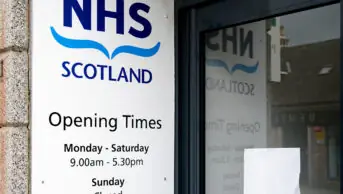
Alamy Stock Photo
When it comes to Brexit, nothing is certain. Members of the UK parliament may have legislated to block leaving the EU without a deal on 31 October 2019, but there is still doubt over whether this law will be circumvented, or even repealed, after a snap general election. And it’s not certain when — or even if — an election will be held.
The impact of a no-deal Brexit is clear. The UK government’s own “reasonable worse case scenario” warns of “significant disruption lasting up to six months” at ports. As a result, it admits that medicines supplies would be “particularly vulnerable”, owing to the fact that three quarters of the UK medicines supply enters the country via this route. And, even though some medicines are being stockpiled in advance to prepare for potential supply issues, some have such a short shelf-life that extra supplies cannot be built up.
Despite this, NHS bosses remain confident. Keith Willett, EU exit strategic commander at NHS England, recently said that the NHS is “categorically” better prepared for a no-deal Brexit in October 2019 than it was in March or April 2019.
Speaking to delegates at the body’s annual Expo conference on 5 September 2019, Willett said: “We need to be honest, absolutely entirely honest, but I don’t think we need to be in a position other than reassurance.”
Andrew Goodhall, director general executive at NHS Wales, is similarly positive. In a letter to NHS bodies sent in April 2019, Goodhall said he had “good confidence” that medicine supplies will be maintained in the event of a no-deal Brexit.
However, The Pharmaceutical Journal has spoken to several pharmacy bodies as the latest Brexit deadline looms and some of them are less than reassured.
Lack of transparency
“We need facts, not reassurance and propaganda,” says Warwick Smith, director general of the British Generic Manufacturers Association, one of the organisations that is currently in talks with the UK government about Brexit preparations.
We’ve been urging the government to make more information publicly available; that is the biggest thing it can do
“We’ve been urging the government to make more information publicly available; that is the biggest thing it can do.” However, Smith adds that poor communication has resulted in a “patchy” understanding of new border procedures by manufacturers.
“I have heard everything from: ‘Yes, we’re right on top of it, we’re fine’ to ‘I’ve heard about it, but I don’t know what I need to do’,” says Smith, adding that delays will occur if truck drivers transporting medicines do not complete the right documentation before coming to the port. “Putting trucks full of medicines into a big car park is not good.”
In August 2018, the Department of Health and Social Care (DHSC) asked all manufacturers to ensure they have a minimum of six weeks’ additional supply of any medicines that pass through the EU. They were also asked to arrange air freight capacity for medicines with a short shelf life, such as medical radioisotopes.
Then, on 15 August 2019, the government tendered a contract asking for bids on an express freight service worth £25m, which is expected to deliver small “time sensitive shipments” within 24 hours, or larger pallets of medicines within 4 days. However, a lack of information about how this will work in practice has led to a third of manufacturers affiliated with the British Generic Manufacturers Association to book their own additional ferry capacity between the UK and the EU, to mitigate the uncertainty surrounding government plans.
A further information gap was created when several pharmaceutical bodies signed non-disclosure agreements (NDAs), or so-called ‘gagging orders’, issued by the DHSC in August 2019 to prevent them from disclosing the UK government’s plans for a no-deal Brexit.
Martin Sawer, executive director at the Healthcare Distribution Alliance, which represents pharmaceutical distributors, said the NDAs are necessary to ensure “the government will hopefully get the best possible advice”. Despite being involved in the confidential talks, he says he still has unanswered questions, particularly relating to fake medicines entering the UK market.
“There is no allowance in the Falsified Medicines Directive (FMD) regulations for a non-EU or EEA country to be a member of the FMD,” he says. “It’s a very real risk, that we then cease to be a member of the FMD system.”
Meanwhile, at the other end of the supply chain, both hospital and community pharmacists are feeling unsettled by the numerous unknowns surrounding no-deal Brexit (see Box).
Box: Unanswered questions on a no-deal Brexit
- 1. Will the government offer any financial help to small manufacturers who are struggling to maintain their Brexit stockpiles?
- 2. Will pharmacies in the UK still have access to the Falsified Medicines Directive (FMD) database after a no-deal Brexit?
- 3. What steps is the government taking to ensure that the UK medicines supply chain is safeguarded against counterfeit medicines if the UK does not have access to the FMD database?
- 4. Will the UK have continued access to long-term European funding and collaboration programmes for science, such as Horizon 2020?
- 5. Will the UK have a reciprocal arrangement with the EU that facilitates ease of movement for scientists, researchers and highly skilled workers?
- 6. Will the UK be seeking a regulatory cooperation agreement, or a mutual recognition agreement with the European Medicines Agency?
- 7. What exactly will the process be for pharmacists to carry out a serious shortage protocol (SSP)?
- 8. Will there be exemptions to SSPs?
- 9. How will does the government plan to mitigate supply and price manipulation within the country?
- 10. Is the government doing anything to mitigate the potential increase in fuel costs, which will affect pharmacy delivery services?
In January 2019 and March 2019, respectively, chief pharmaceutical officers in England and Scotland wrote to pharmacists to reassure them that the government was prepared for a no-deal scenario and urged them not to stockpile medicines in preparation.
Despite these reassurances, a spokesperson from the Guild of Healthcare Pharmacists (GHP), the representative body for hospital pharmacists, says that leaving the EU without a deal would bring a “significant risk” of disruption to the supply of medicines and medical devices, adding that doing so also risks an “increase [in] the public spend on healthcare, for no additional patient benefit”.
It also predicts that “a no-deal Brexit will create more paperwork due to new (and unpredictable) regulatory hurdles in relation to the importation of medicines”.
Apart from stockpiling — which we have been told not to do — everything else is outside of our control
“This will, in turn, be sure to increase the costs to suppliers bringing products to the UK market and these will, inevitably, be passed on to the NHS,” it adds.
Community pharmacists are also confused. Nick Kaye, associate chief officer for Cornwall and the Isles of Scilly local pharmaceutical committee (LPC), says: “Apart from stockpiling — which we have been told not to do — everything else is outside of our control. We can make patients aware and make sure that prescriptions are ordered on time, but there aren’t levers that we can pull.”
He added that because of cuts to community pharmacy funding, even if pharmacies wanted to stockpile medicines, “we don’t have the cash flow to do that”.
Substituting medicines
Following the introduction of serious shortage protocols (SSPs) as part of new legislation in February 2019, community pharmacists could be given the power to substitute medicines in short supply, where required. However, Sandra Gidley, president of the Royal Pharmaceutical Society, says the details on how the SSPs will be used “are a little vague”.
“Bearing in mind we could have been in a no-deal [Brexit] situation at the end of March 2019, it’s really not very impressive that we still don’t have the final shape and form of this,” she says, adding that it is unclear whether there will be exemptions to the protocol, or even what the exact process will be when it comes into force. Details of how the system will work have not been published.
“I think it would be helpful for pharmacists to prepare if they had early sight of [an SSP] and weren’t trying to understand what’s involved if it suddenly has to be used,” she says.
Bruce Warner, deputy chief pharmaceutical officer at NHS England, said at the Health and Care Innovation Expo, held in Manchester in September 2019, that the government has already started consulting with clinicians on suitable alternatives for medicines deemed to be at risk of shortages following a no-deal Brexit.
Manufacturers have established contingency plans to avoid shortages “in the majority of cases”, Warner told delegates, including stockpiling and securing additional routes into the UK. However, “for a few medicines”, NHS England has approached clinical experts for advice on alternatives.
“We’ve said to [these experts], if we’re in a situation where we were running short of this particular medicine, what would we do? What are the alternatives?” he said. “We’ve done that for every individual medicine where we’ve considered the risk of a shortage is higher than we would want it to be.”
Optimistic outlook
The take on preparedness, or otherwise, for a no-deal Brexit varies across the pharmacy sector. The Pharmaceutical Services Negotiating Committee (PSNC) has taken part in Brexit talks with the government, and was one of the bodies to sign an NDA in August 2019.
Simon Dukes, chief executive of the PSNC, says: “The government had what was, in effect, a robust dress rehearsal for a no-deal Brexit at the start of [2019], and we are confident that they have learned lessons from that experience and are now even better prepared for a possible no-deal Brexit.”
Since 31 January 2019, former health minister Stephen Hammond said 23 times in Parliament — with some slight variations — that “we are confident that, if everyone, including suppliers, freight companies, international partners and the health and care system, does what they need to do, the supply of medicines and medical products should be uninterrupted in the event of a no-deal EU Exit”.
However, the government’s reassurances are not enough to convince everyone. “It doesn’t inspire the greatest of confidence,” says Raj Matharu, chief officer of Bexley, Bromley and Greenwich LPC.
“The perception from the outside is that even those close to the process of Brexit don’t seem to have a clue.”


